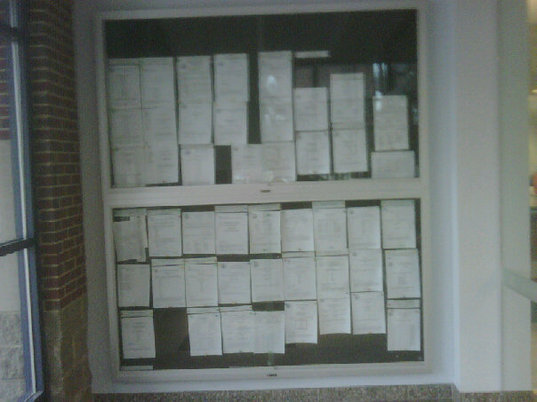Open Meetings Act and the required public posting of notices
The Michigan Open Meetings Act spells out rules under which local governments must provide access to and record information about public meetings. It also sets the standard for notifying the public about when meetings are going to occur, both regularly scheduled meetings and special meetings.
This issue of FOIA Friday is a short photo essay on what can go right and what can go wrong with public notices. The focus is on the ubiquitous public notice posting board inside government offices where someone can walk in, with or without an Internet connection or a newspaper subscription, and see at a glance what meetings are scheduled, which ones are cancelled, and what special meetings are taking place. You'd think that would be easy to get right, but it's a source of more easily preventable problems than you might think.
Getting it right
The local example of getting it right that I think is most readily at hand is how Washtenaw County posts its meeting announcements. There is a big, locked, glassed-in cabinet in the building housing the Washtenaw County Clerk and Register of Deeds offices at 200 N. Main St., and you can see at a glance all of the scheduled and special meetings for the whole county government in one place.

Washtenaw County public notice board at 200 N. Main St., Ann Arbor.
Edward Vielmetti | AnnArbor.com
One thing that I noticed in the county's public notices was that the notices of special meetings were countersigned by a member of the clerk's office, certifying that they were posted in time to meet the state's requirements for 18 hour prior posting of those meetings. This leaves a paper trail and no confusion as to when events were posted and whether they were posted on time.
Public tack board

Meeting notices posted here are also considered legal notices.
Edward Vielmetti | AnnArbor.com
No notice at all
Until recently, the Ann Arbor Downtown Development Agency had no public notice of upcoming meetings published at their primary place of doing business. Instead, the DDA posted those notices at City Hall. This was fixed subsequent to a previous FOIA Friday story noting how this caused me to miss a meeting.
Risks of unsecured posting boards
The biggest reason for a government organization to put a locked notice board in an easily accessible public place is to negate the chance that someone will come along to that tack strip, take a notice home with them by pulling it off the tack board, and then complain subsequently that they were not provided with legal notice.
Locked glass cabinets in public places are one answer to that, and having all meeting notices signed and recorded by the clerk is a second answer.
Generally, complaints about notification of meetings are a sign that something else is going on that people are unhappy about, as in this recent Open Meetings Act complaint in Corunna, Mich. about the Shiawassee County Veterans Affairs Committee, where an open meetings complaint appears to be the tip of the iceberg of more substantial grievances.
Doing better than the minimum required
If I can inject a bit of opinion in here, it seems to me that a city with a Public Arts Commission could spend some of its budget to create meeting notices that were works of art at least on par with concert or movie posters. Imagine if you would a Library Lot RFP review meeting announcement that incorporated artwork from the proposals, or a Taxicab Commission meeting poster that had even a smidgeon of fun with the design.
Edward Vielmetti writes the FOIA Friday column for AnnArbor.com. He is working on a second draft of a Knight Foundation proposal to expand FOIA and public records coverage. Reach him with suggestions at edwardvielmetti@annarbor.com.

